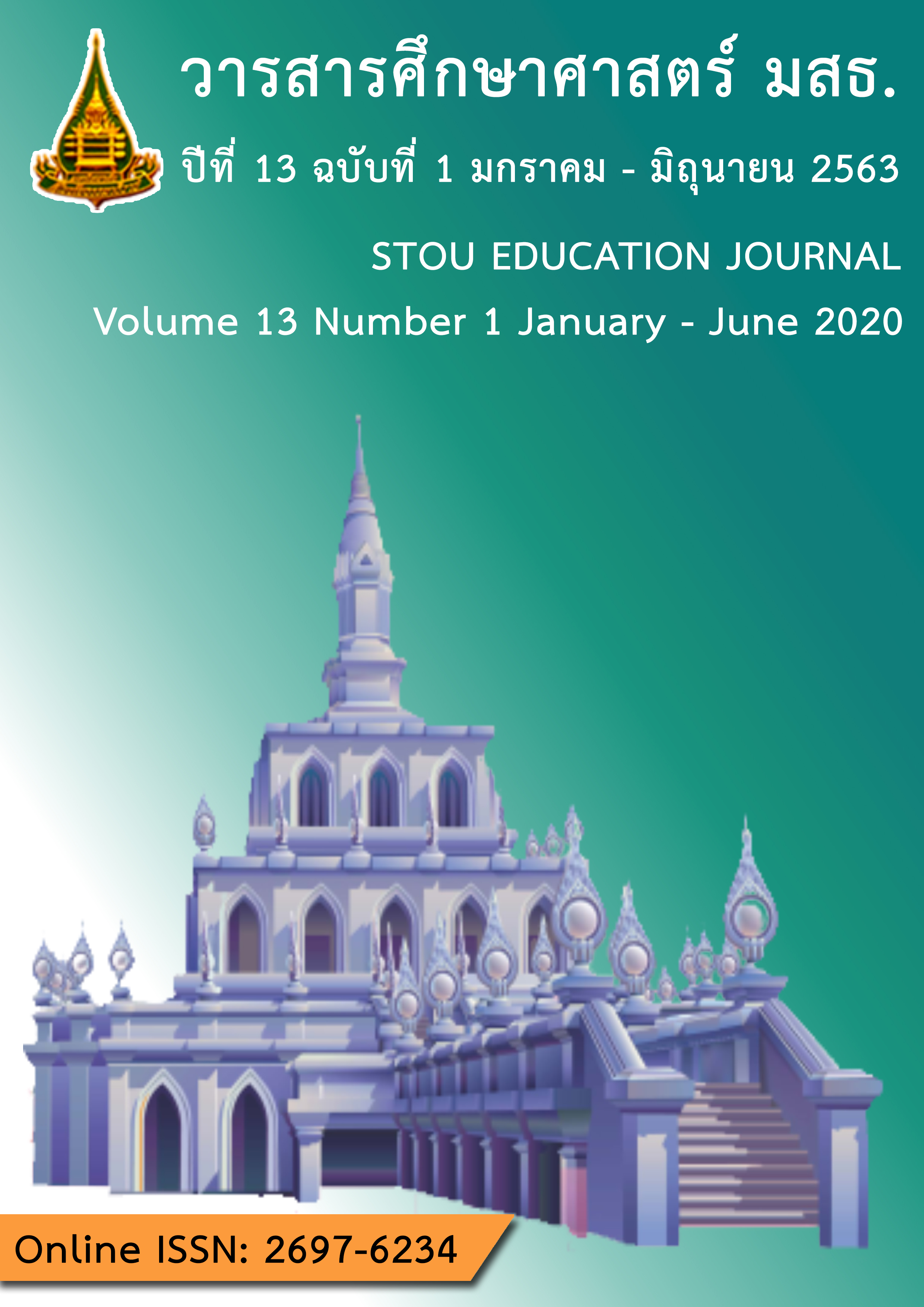Effects of the Co-op Co-op Techniques Using Task Management Tools on Commitment to Work of Lower Secondary School Students
Main Article Content
Abstract
The objectives of this study were 1) to compare the levels of commitment to work of students before and after learning with the Co-op Co-op techniques using task management tools, and 2) to compare the levels of commitment to work of students after learning with the Co-op Co-op techniques using task management tools and those after learning with the Co-op Co-op techniques. The samples comprised 54 Mathayom Suksa 2 students of Singhawittayakom School, Nang Rong district, Buri Ram province, studying in the second semester of the 2018 academic year, obtained by multistage random sampling. These students were then divided into 2 groups of 27 students in each. The research instruments included (1) learning management plans based on the Co-op Co-op techniques using task management tools and learning management plans based on the Co-op Co-op techniques, (2) task management tools, (3) a questionnaire on commitment to work, and (4) an observation form for assessing commitment to work behaviors. The data were analyzed using percentage, mean, standard deviation, and t-test. The results revealed that 1) the average scores of commitment to work of students before and after learning with the Co-op Co-op techniques using task management tools were different at the .05 level of statistical significance, 2) the average scores of commitment to work after learning of the students in both groups were different at the .05 level of statistical significance, and 3) the average score of work commitment behaviors of the students learning with the Co-op Co-op techniques using task management tools was 4.25, indicating a good level.
Article Details
References
กระทรวงศึกษาธิการ. (2551). หลักสูตรแกนกลางการศึกษาขั้นพื้นฐาน พุทธศักราช 2551. กรุงเทพฯ: โรงพิมพ์ชุมนุมสหกรณ์การเกษตรแห่งประเทศไทย จำกัด.
กระทรวงศึกษาธิการ. (2560). แผนพัฒนาการศึกษาของกระทรวงศึกษาธิการ ฉบับที่ 12 (พ.ศ. 2560 - 2564). กรุงเทพฯ: โรงพิมพ์ชุมนุมสหกรณ์การเกษตรแห่งประเทศไทย จำกัด.
ธนิษฐนันท์ ตีระมาศวณิช. (2556). การพัฒนาผลสัมฤทธิ์ทางการเรียนภาษาไทย เรื่อง การเขียนเรียงความและพฤติกรรมความมุ่งมั่นในการทำงานของนักเรียนชั้นประถมศึกษาปีที่ 5 โดยใช้กิจกรรมการเรียนรู้ตามแนวคิดสมองเป็นฐาน. (วิทยานิพนธ์ปริญญาการศึกษามหาบัณฑิต ไม่ได้ตีพิมพ์). มหาวิทยาลัยมหาสารคาม, มหาสารคาม.
นิวัฒน์ สินไชย. (2560). การพัฒนาแนวทางการเสริมสร้างคุณลักษณะอันพึงประสงค์ของนักเรียนสำหรับสถานศึกษาสังกัดสำนักงานเขตพื้นที่การศึกษามัธยมศึกษา เขต 21. (วิทยานิพนธ์ปริญญาการศึกษามหาบัณฑิต ไม่ได้ตีพิมพ์). มหาวิทยาลัยมหาสารคาม, มหาสารคาม.
พรพนา นวลจำรัส. (2556). ผลการพัฒนาการจัดกิจกรรมการเรียนรู้โดยใช้กระบวนการกลุ่มร่วมมือแบบ JIGSAW เรื่อง พลเมืองดีตามวิถีประชาธิปไตยที่มีต่อผลสัมฤทธิ์ทางการเรียนและความมุ่งมั่นในการทำงานของนักเรียนชั้นประถมศึกษาปีที่ 2. (วิทยานิพนธ์ปริญญาการศึกษามหาบัณฑิต ไม่ได้ตีพิมพ์). มหาวิทยาลัยมหาสารคาม, มหาสารคาม.
พระอำนาจ อตฺถกาโม (น้อยนิล). (2554). การศึกษาคุณลักษณะอันพึงประสงค์ของนักเรียนโรงเรียนศึกษาสงเคราะห์บางกรวย อำเภอบางกรวย จังหวัดนนทบุรี. (วิทยานิพนธ์ปริญญาพุทธศาสตรมหาบัณฑิต ไม่ได้ตีพิมพ์). มหาวิทยาลัยมหาจุฬาลงกรณ์ราชวิทยาลัย, กรุงเทพฯ.
พันธ์วิรา สามารถ. (2556). การพัฒนาผลสัมฤทธิ์ทางการอ่านเชิงวิเคราะห์และพฤติกรรมความมุ่งมั่นในการทำงานกลุ่มสาระการเรียนรู้ภาษาไทยของนักเรียนชั้นมัธยมศึกษาปีที่ 1 โดยใช้การจัดกิจกรรมการเรียนรู้แบบ SQ3R. (วิทยานิพนธ์ปริญญาการศึกษามหาบัณฑิต ไม่ได้ตีพิมพ์). มหาวิทยาลัยมหาสารคาม, มหาสารคาม.
วราภรณ์ สินถาวร. (2553). การพัฒนารูปแบบการเรียนแบบผสมผสานแบบร่วมมือโดยใช้แหล่งข้อมูลเป็นหลักในการเรียนรู้เพื่อพัฒนาการรู้สารสนเทศ และทักษะการเรียนรู้เป็นทีมของนักศึกษาครูระดับปริญญาตรี มหาวิทยาลัยราชภัฏ. (วิทยานิพนธ์ปริญญาครุศาสตรดุษฎีบัณฑิต ไม่ได้ตีพิมพ์). จุฬาลงกรณ์มหาวิทยาลัย, กรุงเทพฯ.
วันวิสาข์ ครองสิน. (2555). การพัฒนาเครื่องมือประเมินคุณลักษณะซื่อสัตย์สุจริต มีวินัย ใฝ่เรียนรู้และมุ่งมั่นในการทำงาน สำหรับนักเรียนชั้นมัธยมศึกษาปีที่ 4 จังหวัดยโสธร. (วิทยานิพนธ์ศึกษาศาสตรมหาบัณฑิต ไม่ได้ตีพิมพ์). มหาวิทยาลัยสุโขทัยธรรมาธิราช, นนทบุรี.
สำนักงานคณะกรรมการการศึกษาขั้นพื้นฐาน.(2553ก). แนวทางการพัฒนาการวัดและประเมินคุณลักษณะอันพึงประสงค์ ตามหลักสูตรแกนกลางการศึกษาขั้นพื้นฐาน พุทธศักราช 2551. กรุงเทพฯ: โรงพิมพ์ชุมนุมสหกรณ์การเกษตรแห่งประเทศไทย จำกัด.
สำนักงานคณะกรรมการการศึกษาขั้นพื้นฐาน.(2553ข). แนวทางการจัดการเรียนรู้ตามหลักสูตรแกนกลางการศึกษาขั้นพื้นฐาน พุทธศักราช 2551. กรุงเทพฯ: โรงพิมพ์ชุมนุมสหกรณ์การเกษตรแห่งประเทศไทย จำกัด.
สุมาลี มูลคำ.(2557). ปัจจัยบางประการที่ส่งผลต่อความมุ่งมั่นในการทำงานของนักเรียนชั้นมัธยมศึกษาปีที่ 4 จังหวัดลำปาง สังกัดสำนักงานเขตพื้นที่การศึกษามัธยมศึกษา เขต 35. (วิทยานิพนธ์ปริญญาศึกษาศาสตรมหาบัณฑิต ไม่ได้ตีพิมพ์). มหาวิทยาลัยเชียงใหม่, เชียงใหม่.
สุวิทย์ มูลคำ, และอรทัย มูลคำ.(2550). 19 วิธีจัดการเรียนรู้: เพื่อพัฒนาความรู้และทักษะ (พิมพ์ครั้งที่ 6). กรุงเทพฯ: ภาพพิมพ์.
อภิชาติ สนธิลา และสมบูรณ์ พินธุรักษ์.(2555). การพัฒนาการจัดกิจกรรมการเรียนรู้ลูกเสือสามัญ เรื่อง กิจกรรมการบุกเบิก ชั้นประถมศึกษาปีที่ 6 โดยใช้การจัดการเรียนรู้แบบกลุ่มร่วมมือเทคนิค Co - op Co – op. วารสารครุศาสตร์ มหาวิทยาลัยราชภัฏมหาสารคาม, 1(16), 117-123.
Benek, I. & Bezir, A. B.(2019). A new cooperative learning technique: Question jury. International Journal of Research in Education and Science, 5(2), 681-708.
Chasanidou, D., Elvesæter, B., & Berre, A. J.(2016). Enabling team collaboration with task management tools.Paper presented at the 12th International Symposium on Open Collaboration, Berlin, Germany. Retrieved from https://www.opensym.org/os2016/proceedings-files/p601-chasanidou.pdf
Kagan, S. (1985). Co-op Co-op: In Slavin R., Sharan S., Kagan S., Hertz-Lazarowitz R., Webb C., Schmuck R. (Eds.), Learning to cooperate, cooperating to learn (pp. 437-452). Springer, Boston, MA
Maněna, V., Maněnová, M., Myška, K., & Rybenská, K.(2015). Comparative study of online tools in preparation for future teachers for use in cooperative learning methods. Paper presented at the 2014 International Conference on Future Communication Technology and Engineering (FCTE 2014), Shenzhen, China. Retrieved from https://www.researchgate.net/publication/281232530_Comparative_study_of_online_tools_in_preparation_for_future_teachers_for_use_in_cooperative_learning_methods
Muslihat, D.(2018). What to expect from your task management app. Retrieved from https://zenkit.com/en/blog/what-to-expect-from-your-task-management-app/
Rosenschein, S. J., & Davies, T.(2018). Coordination technology for active support networks: Context, needfinding, and design. AI & SOCIETY, 33(1), 113-123.
Salemme, I.(2016). Top 5 task management tools. Retrieved from: https://www.pipefy.com/blog/task-management/top-5-task-management-tools/


